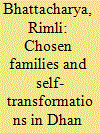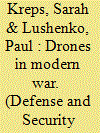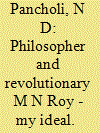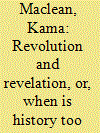| Srl | Item |
| 1 |
ID:
120701


|
|
|
|
|
| Publication |
2013.
|
| Summary/Abstract |
In the Indian subcontinent, the understanding of 'the family' in numerous narrative traditions has always extended into relationships with non-humans, with a pivotal emphasis on the guru-shishya (preceptor-disciple) relationship. This paper focuses on the highly popular English-language 'juvenile fiction' of Dhan Gopal Mukerji to suggest how he reconfigured these narrative traditions for a primarily non-Indian audience in the 1920s-30s. The paper considers Mukerji's young protagonists-invariably male, whether human or animal-in relation to the web of familial and outside social relationships through which the 'quest motif' is played out for a transnational readership. The epic form pervades his 'jungle books' through the figures of the animal protagonists, the search for a leader/guide/guru, and a re-imagining of caste, ethnicity and gender. Of particular interest is the composite mother figure. Dhan Gopal's oeuvre for children maps out a socialisation that is 'free' of the apparatus of the colonial home or of other disciplining institutional sites. Paradoxically, the search to be 'free from fear' can only be played in the alternative topos of the jungle, where violence is inescapable. How, if at all, may these narrative tropes be mapped onto contemporary history?
|
|
|
|
|
|
|
|
|
|
|
|
|
|
|
|
| 2 |
ID:
190876


|
|
|
| 3 |
ID:
123415


|
|
|
|
|
| Publication |
2013.
|
| Summary/Abstract |
I was a student of BA Hons. (History) in Ramjas College, Delhi University in the year 1962-63 when one of our teachers, Dr. Bal whose full name I am not able to recollect, in one of his classes began to eulogize M.N.Roy saying that Roy was a great revolutionary and thinker and had founded the first communist party in the world outside Russia i.e. Mexican Communist Party, played a great role in spreading communist movements in various parts of the world including India as important front-ranking member of the Communist International working with Lenin, Trotsky and Stalin. He further declared that Roy was a man of Lenin's caliber and stature.
|
|
|
|
|
|
|
|
|
|
|
|
|
|
|
|
| 4 |
ID:
147208


|
|
|
|
|
| Summary/Abstract |
If historiography is ordered by a series of thematic and methodological turns, then it is not hard to demonstrate that there has in recent years been a turn towards revolutionary histories of South Asia. Scholars have begun to transcend the limitations of Gandhian frameworks in search of more dynamic understandings of Indian pasts that factor in the role of violence, subterfuge and conspiracy in South Asian anti-colonial struggles. But what happens when new methodologies and narratives begin to destabilise or even invert longstanding historical readings that have been the basis for generations of academic knowledge of the past? When, and under what political and institutional conditions, are fresh interpretations of history sayable? Can historical trajectories or interpretations be quickly turned or must they evolve slowly? This paper is a self-reflexive critique of the ways in which radical histories can—or cannot—be written in the post-colonial moment, with reference to the compulsions brought to bear in the writing of revolutionary history. This article considers these historiographical issues alongside compelling evidence of the involvement of Jawaharlal and Motilal Nehru in key aspects of the revolutionary actions of the Hindustan Socialist Republican Association.
|
|
|
|
|
|
|
|
|
|
|
|
|
|
|
|